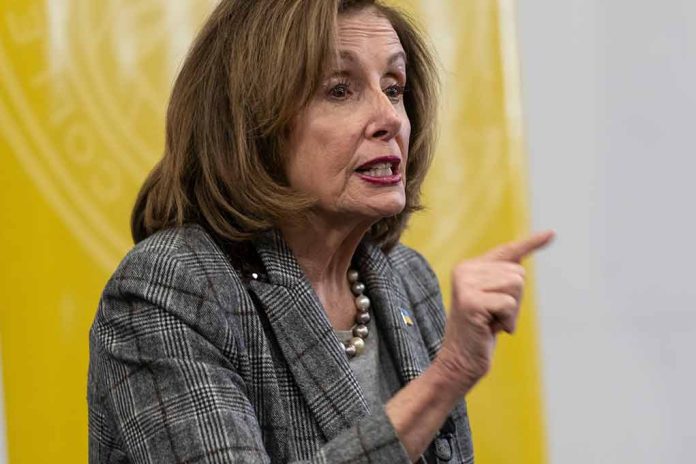
Nancy Pelosi claims Trump’s rhetoric led to the attack on her husband, sparking controversy and debate.
At a Glance
- Nancy Pelosi blames Trump’s rhetoric for the 2022 attack on her husband, Paul Pelosi
- Pelosi made these claims during a CBS News “Face The Nation” interview
- She criticized Trump’s potential pardons for January 6 defendants
- Pelosi stated her husband still suffers from injuries sustained in the attack
Pelosi’s Accusations Against Trump
Former House Speaker Nancy Pelosi, a Democrat from California, has made controversial claims linking President elect Donald Trump’s rhetoric to the violent attack on her husband, Paul Pelosi, in 2022. During a recent interview on CBS News’ “Face The Nation” with Margaret Brennan, Pelosi suggested that Trump’s language has created an environment conducive to violence, with repercussions extending beyond the January 6 Capitol riot.
Pelosi asserted that the consequences of Trump’s words continue to manifest in real-world incidents, including the attack on her husband. She emphasized the lasting impact of such violence, stating that her husband still suffers from injuries sustained during the assault.
🚨🇺🇸 PELOSI: JAN. 6 VIOLENCE “DIDN’T END THAT DAY”
Nancy Pelosi claims the fallout from the Capitol attack lingers, citing the assault on her husband while taking a swipe at Trump’s promise to pardon Jan. 6 rioters.
Critics, including Pelosi and some former Capitol Police… https://t.co/4bzkJr0NC3 pic.twitter.com/aua9ChFV4b
— Mario Nawfal (@MarioNawfal) January 6, 2025
Criticism of Potential Pardons
The former Speaker also expressed concern over Trump’s proposal to extend pardons to some individuals involved in the January 6 Capitol insurrection. Pelosi questioned the wisdom and morality of such decisions, suggesting that it could set a dangerous precedent.
“It’s really a strange person who’s going to be President of the United States, who thinks that it’s okay to pardon people who are engaged in an attack.” – Nancy Pelosi
Pelosi’s comments highlight the ongoing debate surrounding accountability in political discourse and the potential consequences of inflammatory rhetoric. Her statements underscore the deep divisions that persist in American politics, particularly concerning the events of January 6 and their aftermath.
Continued Impact of Political Violence
Pelosi emphasized that the effects of political violence extend far beyond the immediate incident. She drew a direct line between Trump’s rhetoric and the attack on her husband, suggesting that such language emboldens individuals to commit acts of violence.
“Now it didn’t end that day, As you know, he called out to these people to continue their violence, my husband being a victim of all of that, and he still has injuries from that attack. So it just goes on and on. It isn’t something that happens and then it’s over. No, once you are attacked, you have consequences that continue.” – Nancy Pelosi
While Pelosi’s claims have garnered attention, it’s important to note that the motivations behind the attack on Paul Pelosi remain a subject of investigation and debate. The incident has become a focal point in discussions about political violence and the responsibilities of public figures in shaping public discourse.
Reactions and Implications
Pelosi’s statements have elicited mixed reactions from across the political spectrum. Supporters view her comments as a necessary call for accountability, while critics argue that her claims oversimplify complex issues and unfairly attribute blame.
The ongoing debate surrounding these issues underscores the challenges facing American democracy as it grapples with political polarization and the aftermath of contentious events like the January 6 riot. As the country moves forward, finding common ground and addressing the root causes of political violence remain crucial challenges for leaders on both sides of the aisle.
Sources:
- Nancy Pelosi Falsely Suggests Her Husband Was A ‘Victim’ Of Trump’s Rhetoric
- Nancy Pelosi Falsely Suggests Her Husband Was A ‘Victim’ Of Trump’s Rhetoric



